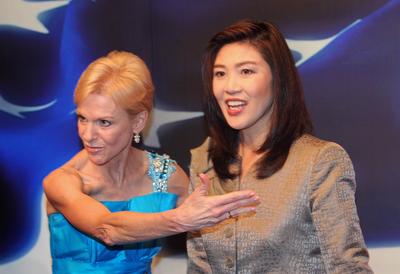Pheu Thai will likely have to give up chairs in several ministries, but will definitely reserve ministries in security and foreign affairs. During press conferences to announce her coalition parties on 4 July, Yingluck stipulated that restoring Thailand’s foreign relations will be among her government’s immediate priorities.
Although Yingluck is yet to substantively comment on her foreign policy agenda, its orientation can be deduced from her ‘Thailand vision 2020’, announced before the election. The Vision 2020 clearly shows that the new government will likely have an outward oriented policy emphasising Thailand’s leading role in the international arena. It reinvigorates Thailand’s desire to be a regional hub for many activities, such as aviation, finance, health services and food production. This policy vision is arguably identical to Thaksin’s foreign policy during his premiership. He promoted Thailand’s role in the region through the creation of a dual strategy based on both regional forums and a web of bilateral trade agreements. Yingluck underscored that ‘there is a lot of hard work ahead’, when the preliminary election result suggested her party had gained a majority.
At the regional level, Yingluck will need to restore Thailand’s role in ASEAN and beyond. If Thaksin’s idea is influential in Yingluck’s foreign policy formulation, one thing we can expect from her government is attempts by Thailand to revive its influence in regional affairs. Its own version of regional and sub-regional initiatives (such as ACD, ACMECS and BIMSTEC) will be renewed. Thailand may also try to resume its active role in ASEAN, which has diminished since the coup in 2006. Such a move will only be possible if Thailand’s problems with Cambodia are resolved amicably and its attachment to democratic principles at home is proved sustainable.
It is still not clear how Yingluck will fix Thai–Cambodian relations. There is a high chance she may reverse some of Abhisit’s decisions, particularly Thailand’s withdrawal from UNESCO’s World Heritage Committee. She may take the previous position of supporting joint management of the Preah Vihear Temple. Her main challenge is to find a way to resume bilateral talks with Cambodia on border management issues without risking another prolonged protest from conservative groups. Thaksin confirmed this position in a TV interview after the election: that Thailand would need to resume a normal negotiation process with neighbouring countries on border demarcation. The government needs to communicate with the Thai public about this issue clearly.
We may see another ultra-nationalist rally against Yingluck’s policy over this issue. Such a protest may become aggravated, leading to a demonstration in the future. There are people, especially in Bangkok and the southern provinces, who do not like the Red Shirt and Pheu Thai victory. They are ready to join any protest if the campaign sounds legitimate, and the territory integrity issue is always a legitimate one!
As an elected PM, Yingluck could use her position to restore Thailand’s standing as a proponent of democracy in the region. However, Yingluck will have to face other complications in Thai foreign relations with Myanmar. While the new Myanmar government is ‘democratically elected’, the influence of the military in politics is evident. Dealings with the regime there may follow a similar pattern to what has been done in the past, but be more legitimate in many aspects. No matter what, Yingluck will have to balance Thailand’s position vis a vis the context of democratisation in Myanmar. She cannot afford to focus only on reaching economic deals with Naypyidaw as her predecessors did with the junta, and pay no attention to Myanmar’s human rights. Her position on this issue is unclear. As a female PM, she will be expected to express more sympathy on human rights issues by rights groups and activists, including the matter of refugees along the Thai–Myanmar border. She may also be called on to lend her moral support for Aung San Suu Kyi, which could damage Thai–Myanmar relations.
Given the US’s re-engagement with regional democratic development, Thailand’s democratic stability will be of interest to them. As Thailand is the second largest economy in Southeast Asia and its long-time US ally, the US will need to keep Thailand on track. The US approach to Thai politics since the 2006 coup has been viewed for using an interventionist approach, such as in the case of a meeting between the US Assistant Secretary of State and Red Shirt leaders during the political protests in May 2010. Yingluck’s campaign for democracy will inevitably attract US’s involvement in Thailand’s democratic consolidation in the near future.
Yingluck’s vision for Thailand may, at the same time, inevitably further anchor Beijing’s influence in Thailand and the Mekong sub-region. She wants to achieve an improvement in Thailand’s international competitiveness by developing provincial urban areas, as well as the country’s domestic railway network. This policy will likely have to synchronise closely with China’s plan to extend hi-speed railways to Southeast Asia.
The escalating Chinese and US presence may also lead to power competition. Since Thailand needs to cultivate relations with both powers, it will need to employ a balancing strategy — a difficult task.
These challenges will be central to Yingluck’s success as a manager of Thailand’s foreign relations, especially given she has no experience in foreign affairs. Thailand needs, at this stage, a clear and sophisticated foreign policy formulation to cope with these challenges. It also needs the next foreign minister to be someone who not only knows how to sell Thailand’s products but also understands the sensitivity of domestic politics in Thai foreign relations, and the complexity of the regional political economy.
Pongphisoot Busbarat is a research associate at the Department of Political and Social Change at the Australian National University.

